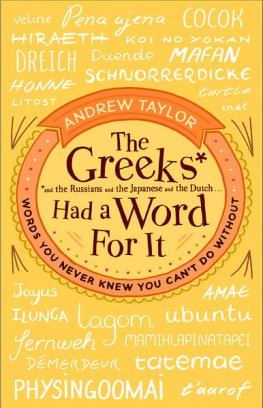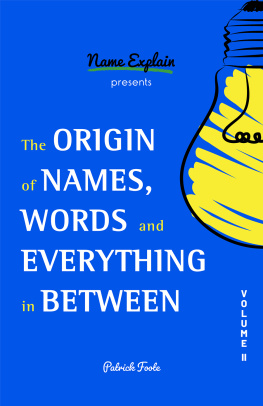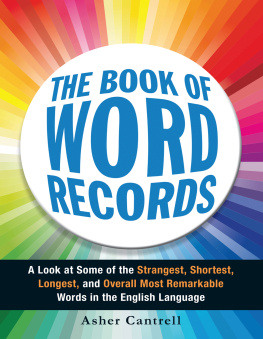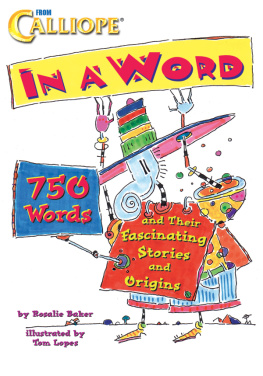In the old daysthe very old daysbeing able to go to school meant you had a lot of time on your hands.
THATS BECAUSE THE WORD SCHOOL comes from the Greek word schole, meaning leisure. Greek philosophers like Aristotle and Plato used to gather groups of young men who werent going to be distracted by mundane activities like working a job; they taught these young men, and called the gatherings scholea name that carried the clear suggestion that these students could afford to spend their time doing something that most other people couldnt.
The name stuck, and later on, the Romans turned the Greek word that had come to mean gathering of students into schola, which in turn gave rise to English words like school, scholastic, and scholar. Nowadays, the idea that only cultured, leisured people should go to school has fallen out of favorone can only wish that school time were still considered leisurely!
When you use the word school in the phrase school of fish, youre using a word with the same spelling, but a different lineage. Thats because the word school in school of fish descends from a Dutch word thats akin to the Old English word scolu, meaning gathering of people.
TRUE OR FALSE
A school can also mean, A group of persons drinking together in a bar or public house, and taking turns buying the drinks.
ANSWER True.
Now, who wants to buy the first round?

I am
- A. an etymologist
- B. a philologist
- C. a nicebecetur
- D. all of the above
(Answer: d. A nicebecetur is a fine, dainty, or fashionable woman. Some people will try to tell you that the word is obsolete, but I just used it, which makes this book a published, contemporary citation of modern usage. Draw your own conclusion.)

THE WORD ETYMOLOGY itself has an etymology, an origin. The first half comes from the Greek word etymos, which means true, and the second half comes from the Greek word for word, which is logos. An etymologist, then, is someone who finds out the truth about words, someone who separates myth from history in the field of language.
This is a fascinating job to have, because there are stories inside every word, just as there are stories inside every person, every community, and every country. Of course, not all of the stories we hear about words are true; some are false, and some are just plain bizarre. In this book, you and I will get to the bottom of some of the best stories.
I confess: I am in love with the English language. And no entry in this book serves as better evidence of the kind of long-running, public love affair I have chosen to pursue than philology a word that proves once and for all that my lifes work really is (in the immortal words of Tina Turner) a love thing.
PHILOLOGY TRACES ITS ANCESTRY through an old Latin word, philologia, that literally means love of learning or love of letters. That Latin word came from two Greek words, philo (meaning love) and logos, (meaning word or speech). To me, philology will always mean the love of words.
Now I want you to visualize a rushing river that is barreling through time and space, from Ancient Greece toward the twenty-first century, carrying you and me along with it. Up ahead, the river is about to split off into three different directions. In modern English, the river we are riding, the river called philology, has divided into different fast-running, complementary streams of meaning. One branch of the river is the study of the relationship of languages, and especially the study of the history of languages as reflected in their texts; a second branch of the river means just the study of old texts to learn more about a people or a culture; and a third branch means just the study of literature. (Yet another branch, meaning the science of language itself, has never really caught on in the United States, and is likely to flow instead into conversations of linguistics, as we shall see in the next entry.)
Which branch of the river will we take? I say we take all threewherever they lead.

TRUE OR FALSE
The field of comparative philology identified unexpected similarities between Sanskrit and European languagesand postulated a hypothetical common language that lay behind both sets of language traditions.
ANSWER True. The hypothetical common language is known today as Proto-Indo-European.)

What does language do?
This seems like an easy question at first, but if you stop to think about it, youll realize its more complicated than it seems.
HERES MY ANSWER: Language describes the world for us, but it also shapes our world as we describe iteither to ourselves or someone else.
As it happens, the linguist Benjamin Lee Whorf, author of Language, Thought, and Reality, agrees with me on this one. He wrote, Language shapes the way we think, and determines what we can think about. Whorf also believed that we human beings dissect nature along lines laid down by our native language. Language is not simply a reporting device for experience, but a defining framework for it.
The word linguistics itself, which broadly means that which pertains to language or languages, can show us how words can both inform us and shape our world in the process. For instance: If I were to tell you that you should learn more about linguistics, you might decide to ignore me. Yet if I were to tell you that linguist derives from the Latin lingua, meaning language or tongueand if I were to add that the way we use linguistics today draws on a much older meaningone who uses his tongue freelyperhaps you would be interested in looking a little more deeply at linguistics. Suddenly, its possible that you would be motivated to find out what this linguistics business is all about! Language has just shaped your experience (and mine as well) by appealing to the unique inner resonances of a word, in this case, the word tongue .

















